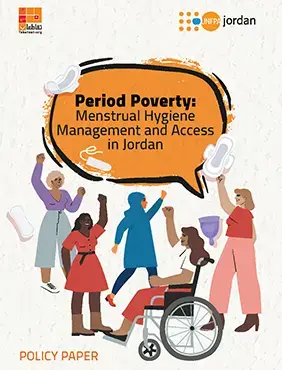The policy paper sheds light on the situation in Jordan regarding Menstrual Hygiene Management, the ability of women and girls in Jordan to access services and information on menstruation and the impact of the legislative, economic and social gaps in accessing health products related to the menstrual cycle.
In Jordan, recent research is shedding light on this phenomenon, which has not been dealt with yet by public health institutions. Accordingly, feminine hygiene products that women and girls need during their menstrual cycle have not been listed under essential healthcare items until now. This is in addition to the many misconceptions, social norms, and wrong uses of menstrual health products and the difficulty of obtaining them, all of which increases the suffering of many women and girls. Whether due to the lack of availability of feminine hygiene products in public healthcare centres, the absence of purchase power, the stigma attached to buying the products in public, or the lack of clean and safe spaces to use these products, the economic factor constitutes a pivotal aspect of this issue since this problem has worsened in Jordan in pockets of poverty, refugee camps, and host communities.
The paper is based on consultations conducted with a number of women and girls in Jordan, to understand their experience in Menstrual Hygiene Management, and the challenges they face during menstruation. The paper also discusses solutions that can help obtain menstrual products and the access to information without experiencing social and/or economic constraints, and ensure women’s health and mental wellbeing.


